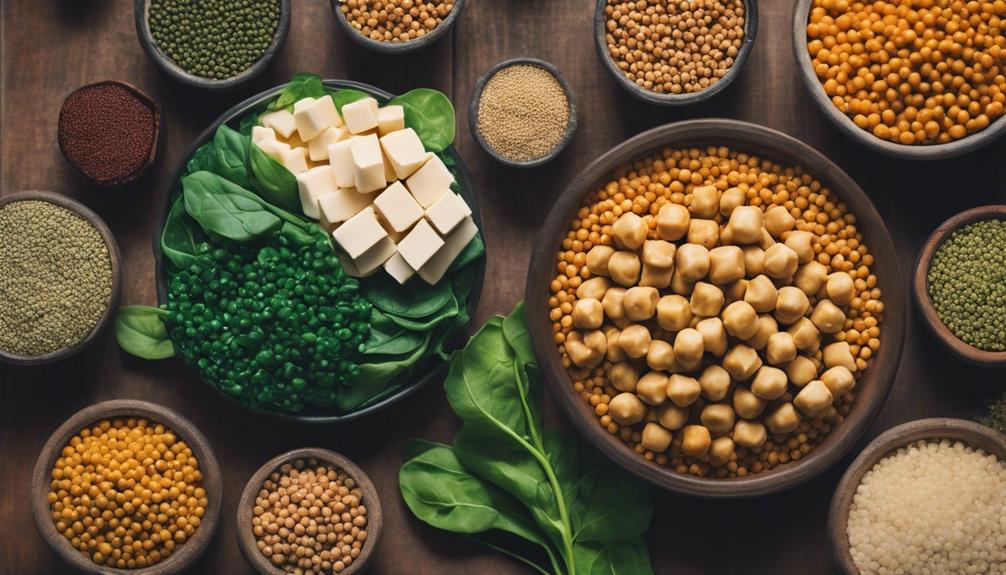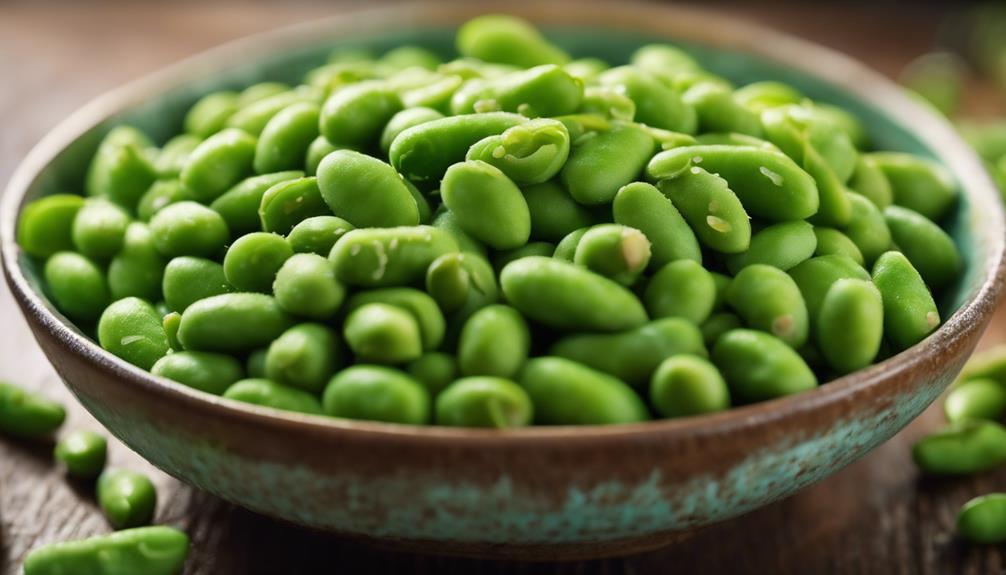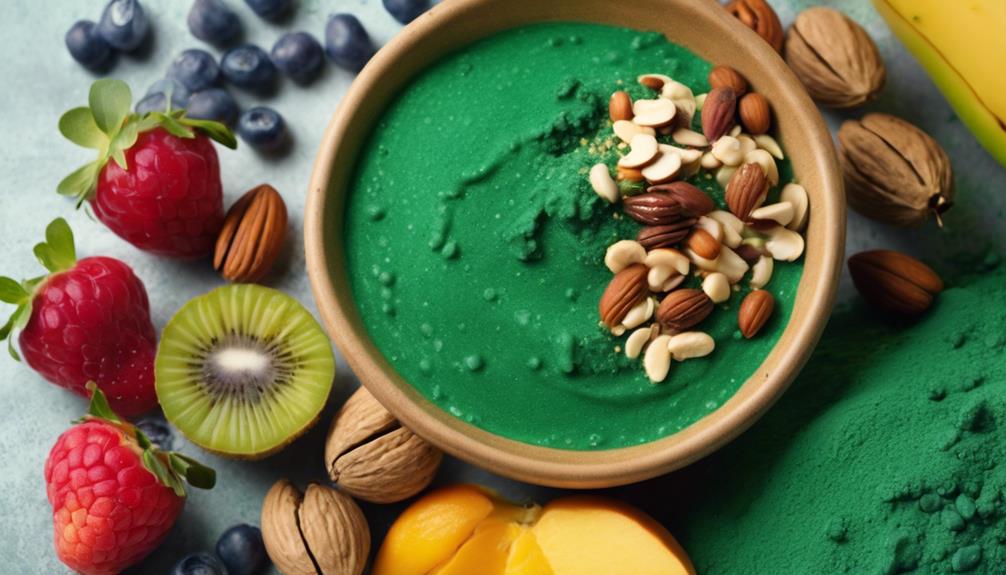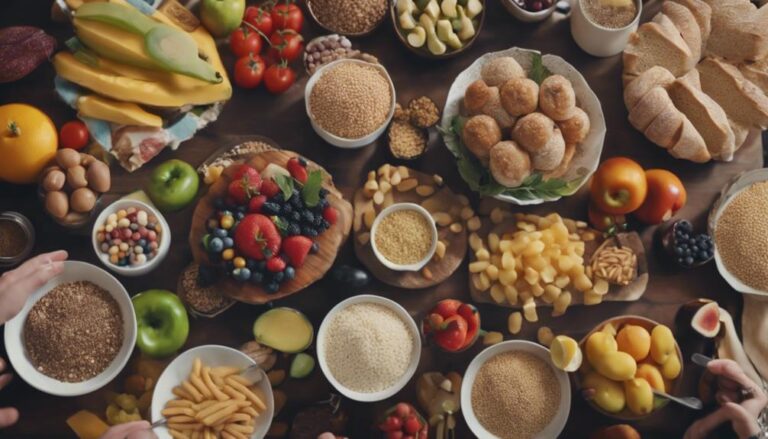The Best Plant-Based Protein Sources Explained
Looking to boost your protein intake while following a plant-based diet? Ever wondered which plant-based sources pack the most protein punch? Plant-based protein sources offer an array of benefits, but do you know which ones stand out above the rest?
By exploring the top plant-based protein sources and their unique nutritional profiles, you can make informed choices to optimize your dietary needs.
Key Takeaways
- Legumes, lentils, and chickpeas offer rich plant-based protein, fiber, and minerals for a nutritious diet.
- Nuts, seeds, and nutritional yeast provide diverse protein sources, heart-healthy fats, and added flavor to dishes.
- Tofu, tempeh, and seitan are versatile protein sources low in calories, suitable for various cooking methods.
- Quinoa and chia seeds offer complete protein, essential nutrients, and benefits for muscle repair and gut health.
Legumes
Legumes provide a rich source of plant-based protein essential for a balanced diet. These versatile legumes, including beans, lentils, and chickpeas, offer numerous benefits such as being high in fiber, vitamins, and minerals while being low in fat. When cooked properly, legumes can be a delicious addition to your meals, offering a substantial amount of protein to support your overall health and well-being.
Cooking with legumes opens up a world of culinary possibilities. From hearty bean stews to spicy chickpea curries, there are endless recipes to explore. Legumes can be used in salads, soups, dips, and even desserts, showcasing their adaptability in various cuisines worldwide.
In terms of protein content, legumes stand out as an excellent plant-based source, with some varieties containing as much protein as meat. By incorporating legumes into your diet regularly, you can ensure you're meeting your protein needs while also enjoying the diverse flavors and textures they bring to your meals.
Nuts and Seeds
Nuts and seeds offer a diverse range of plant-based protein sources that can significantly contribute to a well-rounded and nutritious diet. These power-packed foods aren't only rich in protein but also provide essential nutrients and health benefits.
When it comes to nutritional benefits, nuts and seeds are loaded with heart-healthy fats, fiber, vitamins, and minerals. They can help lower cholesterol levels, reduce inflammation, and support overall heart health. Additionally, the protein content in nuts and seeds makes them a great meat alternative for vegetarians and vegans.
Incorporating nuts and seeds into your diet can be quite versatile. From snacking on almonds and pumpkin seeds to using chia seeds and flaxseeds in smoothies or oatmeal, there are numerous culinary uses for these nutritious gems.
Moreover, the health benefits of consuming nuts and seeds regularly extend to weight management, improved digestion, and enhanced brain function. So, next time you're looking to boost your protein intake, consider adding a variety of nuts and seeds to your meals for a tasty and nutritious punch.
Tofu and Tempeh
Tofu and tempeh are versatile plant-based protein sources that offer a range of health benefits and culinary possibilities.
Tofu, made from condensed soy milk, is a great source of iron, calcium, and protein. It's low in calories and cholesterol-free, making it an excellent addition to a balanced diet. Tofu can be used in various dishes like stir-fries, smoothies, and salads. For a tasty tofu recipe, try marinating tofu cubes in soy sauce, garlic, and ginger, then bake or pan-fry until golden brown for a flavorful dish.
On the other hand, tempeh is made from fermented soybeans, which enhances its digestibility and nutrient absorption. The fermentation process also produces probiotics that promote gut health. Tempeh is rich in protein, fiber, and vitamins like B12. When cooking tempeh, try marinating it in a mixture of soy sauce, maple syrup, and liquid smoke before baking or grilling for a smoky flavor. Incorporating tempeh into dishes like tacos, sandwiches, or stir-fries can add a hearty and nutritious element to your meals.
Quinoa
Quinoa, a nutrient-rich whole grain, is a versatile and complete plant-based protein source that offers numerous health benefits. Here are some key points to consider when incorporating quinoa into your diet:
- Complete Protein: Quinoa is one of the few plant-based foods that contain all nine essential amino acids, making it a complete protein source that can help support muscle repair and growth.
- High in Fiber: With approximately 5 grams of fiber per cooked cup, quinoa can aid digestion, promote satiety, and support overall gut health.
- Rich in Nutrients: Quinoa is packed with essential nutrients such as magnesium, iron, and manganese, which play crucial roles in energy production, blood cell formation, and antioxidant defense.
- Versatile Usage: From salads to stir-fries, quinoa can be used in a variety of dishes. Explore different quinoa recipes like quinoa salads, stuffed bell peppers, or quinoa bowls for a nutritious and satisfying meal.
For more insight into quinoa nutrition facts and delicious quinoa recipes, consider incorporating this powerhouse grain into your plant-based diet.
Lentils
Lentils, a versatile legume packed with plant-based protein and essential nutrients, offer a plethora of health benefits when incorporated into your diet. Lentils are an excellent source of protein, with around 18 grams of protein per cooked cup, making them a fantastic meat alternative for vegetarians and vegans.
Lentils can be used in various dishes, from lentil pasta to hearty lentil soups. Lentil pasta is a great way to enjoy the benefits of lentils while indulging in a delicious meal. Lentils also provide a good amount of fiber, which is beneficial for digestive health and helps you feel full longer, making them a great choice for weight management.
When making lentil soup, consider adding a variety of vegetables and herbs to enhance the flavor and nutrient profile. Cooking lentils with onions, garlic, and a mix of aromatic spices can elevate the taste of your dishes. Remember to rinse lentils before cooking to remove any debris and soak them to reduce cooking time.
Incorporating lentils into your diet can boost your protein intake and provide essential nutrients for overall well-being.
Chickpeas
Chickpeas, also known as garbanzo beans, are a versatile legume rich in plant-based protein and essential nutrients. These tiny legumes can be a great addition to your diet, offering a wide range of health benefits. Here's why you should consider incorporating more chickpeas into your meals:
- Rich in Protein: Chickpeas are an excellent plant-based protein source, making them ideal for vegetarians and vegans looking to meet their protein needs.
- High in Fiber: With a good amount of fiber, chickpeas can aid digestion and promote gut health.
- Packed with Vitamins and Minerals: Chickpeas are loaded with essential nutrients like iron, magnesium, and folate, supporting overall well-being.
- Versatile in Cooking: From hummus to salads and curries, chickpeas can be used in a variety of delicious recipes to add flavor and nutrition to your meals.
Incorporating chickpeas into your diet can't only enhance your culinary experience but also provide numerous health benefits. Why not try out some new chickpea recipes today to reap all the goodness they've to offer?
Edamame
For another powerhouse plant-based protein source, consider exploring the nutritional benefits of edamame, a versatile and nutrient-rich legume that can be a great addition to your diet. Edamame, young soybeans, are packed with protein, making them an excellent meat alternative for vegetarians and vegans. In addition to being a good source of plant-based protein, edamame is also rich in fiber, antioxidants, vitamins, and minerals.
Edamame benefits include supporting bone health, reducing the risk of heart disease, and aiding in weight management due to its high protein and fiber content. These beans are also easy to prepare; you can enjoy them boiled, steamed, or even roasted. Edamame can be added to salads, stir-fries, soups, or enjoyed as a snack on its own.
To incorporate edamame into your meals, try adding them to a quinoa salad for an extra protein boost or blending them into a creamy edamame hummus. With its versatility and health benefits, edamame can be a delicious and nutritious addition to your plant-based diet.
Chia Seeds
Chia seeds are a nutritional powerhouse packed with protein, fiber, antioxidants, and omega-3 fatty acids, making them a valuable addition to a plant-based diet. Here are some reasons why you should consider incorporating chia seeds into your meals:
- Nutritional Benefits: Chia seeds are rich in protein, containing all essential amino acids, making them a complete plant-based protein source. They're also high in fiber, promoting digestive health, and loaded with antioxidants that help combat inflammation in the body.
- Chia Pudding Recipes: Create delicious and nutritious chia pudding by mixing chia seeds with plant-based milk and letting it sit overnight. Add flavors like cocoa powder, vanilla extract, or fruits for a tasty treat.
- Chia Seed Smoothie Variations: Boost your smoothies by adding chia seeds for an extra protein and fiber kick. Blend them with your favorite fruits and vegetables for a refreshing and filling beverage.
- Cooking Tips: Sprinkle chia seeds on top of salads, yogurt, or oatmeal for added crunch and nutrition. You can also use them as an egg substitute in vegan baking recipes.
Hemp Seeds
Hemp seeds, known for their impressive nutritional profile, are a versatile plant-based protein source that offers a range of health benefits. These tiny seeds are packed with essential nutrients like omega-3 and omega-6 fatty acids, which are beneficial for heart health and reducing inflammation in the body. Additionally, hemp seeds are a complete protein, containing all nine essential amino acids that the body can't produce on its own.
Cooking with hemp seeds is a great way to incorporate them into your diet. You can sprinkle them on top of salads, yogurt, or oatmeal for an added crunch. They can also be blended into smoothies or used as a topping for soups and stews. Roasting hemp seeds can enhance their nutty flavor, making them a delicious snack on their own.
When it comes to the health benefits of hemp seeds, they're known to support healthy skin, hair, and nails due to their high content of vitamins and minerals. The fiber in hemp seeds also aids in digestion and helps you feel full longer, making them a great addition to a balanced diet.
Nutritional Yeast
A valuable addition to plant-based diets, nutritional yeast provides essential nutrients and a unique flavor profile for various dishes. Here are four reasons why you should consider incorporating this versatile ingredient into your meals:
- Rich in Nutrients: Nutritional yeast is a powerhouse of essential vitamins and minerals, including B-vitamins like B12, which are crucial for vegans and vegetarians.
- Flavorful Seasoning: Known for its cheesy, nutty taste, nutritional yeast is a popular choice for adding a savory kick to dishes like pasta, popcorn, or even salads.
- Vegan Cheese Alternative: When blended with nuts or seeds, nutritional yeast can be used to create dairy-free cheese sauces or sprinkled on top of dishes for a cheesy flavor without the need for animal products.
- Versatile Cooking Ingredient: From soups to casseroles, nutritional yeast can elevate the taste of various recipes while providing an extra dose of protein and flavor to your plant-based meals.
Spirulina
Spirulina, a nutrient-rich blue-green algae, is renowned for its exceptional health benefits and versatility in plant-based diets. This superfood is packed with protein, essential amino acids, vitamins, and minerals, making it a valuable addition to your diet. Spirulina offers various health benefits, such as supporting immune function, reducing inflammation, and providing antioxidant properties. Additionally, it may help lower cholesterol levels and blood pressure, promoting heart health.
Incorporating spirulina into your diet is easy. You can blend it into smoothies, mix it into energy balls, or sprinkle it over salads for a nutrient boost. Some creative recipes include spirulina-infused guacamole or spirulina energy bars.
When considering sustainability, spirulina is an eco-friendly protein source that requires minimal water and land to cultivate compared to traditional livestock farming. If you struggle to meet your protein needs on a plant-based diet, spirulina supplementation can be a convenient solution. Ensure you choose a reputable brand to guarantee purity and quality.
Seitan
With its high protein content and versatile culinary applications, Seitan emerges as a valuable plant-based protein source to consider incorporating into your diet. Seitan, also known as wheat gluten, is made by washing wheat flour dough with water to remove the starch, leaving behind the gluten, which is then cooked and seasoned.
Here are some key points to consider when exploring Seitan:
- High Protein Content: Seitan is exceptionally rich in protein, making it a great meat substitute for vegetarians and vegans looking to increase their protein intake.
- Seitan Recipes: There are numerous ways to prepare Seitan, including grilling, sautéing, or baking. Its chewy texture and ability to absorb flavors make it a versatile ingredient in various dishes.
- Seitan vs Tofu: While tofu is made from soybean curds, Seitan is derived from wheat gluten. Seitan tends to have a denser texture and a more meat-like consistency compared to tofu.
- Nutrient Profile: Seitan is low in carbohydrates and fats, making it a suitable option for those watching their calorie intake. However, it's essential to note that Seitan may not be suitable for individuals with gluten sensitivities or celiac disease.
Frequently Asked Questions
Can Plant-Based Protein Sources Provide All the Essential Amino Acids Needed by the Body?
Yes, plant-based protein sources can provide all the essential amino acids your body needs for protein adequacy. By combining different plant proteins like legumes, grains, nuts, and seeds, you can ensure a complete amino acid profile.
How Can I Ensure I Am Getting Enough Protein From Plant-Based Sources in My Diet?
To ensure you're getting enough protein from plant-based sources, focus on protein combinations and nutrient absorption. By mixing different plant proteins and pairing them with foods high in vitamins like C, you can optimize your protein intake.
Are There Any Potential Side Effects or Allergies Associated With Consuming Plant-Based Protein Sources?
To protect against protein sensitivities and potential reactions from plant-based sources, monitor your intake carefully. Common allergens like soy, wheat, and nuts can trigger adverse effects. Consult a dietitian if concerns arise.
Can Athletes and Bodybuilders Meet Their Protein Requirements Exclusively From Plant-Based Sources?
You can absolutely meet your protein needs solely with plant-based sources as an athlete or bodybuilder. Proper meal planning and incorporating protein supplements strategically can help optimize your performance and muscle growth.
How Do Plant-Based Protein Sources Compare in Terms of Digestibility and Absorption With Animal-Based Proteins?
When it comes to protein absorption and digestion, plant-based sources might have lower bioavailability than animal-based proteins. The quality of plant proteins can vary, affecting how efficiently your body uses them.
Conclusion
Overall, plant-based protein sources offer a wide range of health benefits and can easily be incorporated into your diet. By including legumes, nuts, seeds, tofu, quinoa, lentils, hemp seeds, nutritional yeast, spirulina, and seitan, you can meet your protein needs while also supporting your overall well-being.
So next time you're planning your meals, consider adding some of these nutritious options for a balanced and sustainable plant-based diet.












